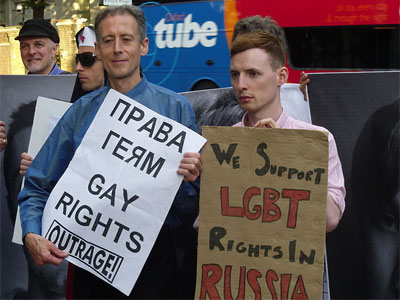Gay Rights in Russia: Wrong Ways to Protect Them
Sanctioning Russia over gay rights still won't work.
 I am grateful to Jamie Kirchick for his lengthy response to my comments about gay rights in Russia, and about how the United States government should respond to Russia’s new antigay law. Kirchick argues that the U.S. should use the Magnitsky Act to sanction Russian individuals and legislators who have carried out or endorsed harsh persecution of gays. Unfortunately, his arguments remain unpersuasive.
I am grateful to Jamie Kirchick for his lengthy response to my comments about gay rights in Russia, and about how the United States government should respond to Russia’s new antigay law. Kirchick argues that the U.S. should use the Magnitsky Act to sanction Russian individuals and legislators who have carried out or endorsed harsh persecution of gays. Unfortunately, his arguments remain unpersuasive.
Much of Kirchick’s case hinges on the utility of sanctions in advancing human-rights goals. “If history is any guide,” he states, “imposing a cost for human rights abuses will, in the long run, weaken Russia’s authoritarian regime.” Kirchick thus invokes the 1974 Jackson-Vanik amendment, which blocked full trade relations with the Soviet Union over its restrictions on emigration by its Jewish citizens. Jackson-Vanik, he says, “is today widely acknowledged as having played a significant role in the eventual collapse of the Soviet Union.” This is too sweeping. Communism was the real author of the Soviet collapse. A planned economy was never going to last, no matter how many dissidents were imprisoned in mental hospitals or the Gulag.
If Jackson-Vanik did not bring down the Soviet Union, what did it accomplish? Alas, Jewish emigration from the Soviet Union actually fell when Jackson-Vanik was passed, and Jackson-Vanik did not prevent that emigration from slowing to a trickle in the 1980s. Whether it had any positive impact at all remains a subject of some controversy. Kirchick, in responding to my warning that American legal pressure under the Magnitsky Act might provoke further antigay violence by extremists and stiffer antigay laws from the government (the latter with precedent, since the Russian Duma responded to other uses of the Magnitsky Act with restrictions on Russian orphans), announces, “What we do know is that the steps the West has taken thus far – righteous denunciations, pouring Stolichnaya down sewer drains – have done nothing to arrest the ever-darkening situation in Russia.”
Yet the ineffectiveness of prior measures doesn’t mean we should take different measures, willy-nilly. The actions Kirchick proposes may be emotionally satisfying, but they may accomplish less than those righteous denunciations. They will also likely provoke a reaction from the Duma. They will likely strengthen Putin, who, having just announced he’s divorcing his wife, has decided to present himself as a guardian of traditional Russian morality. The cold, hard truth is that the Russian public broadly agrees with Putin’s view of gay rights—one of few issues on which he enjoys such support—and it is hard to see why minor foreign sanctions would convince them otherwise. And Putin would score easy points by pointing out that large swaths of the world treat gays far worse, yet face no similar sanctions.
I have nothing but admiration for Kirchick’s audacious move during an appearance on Moscow-funded agitprop network RT, where he wore a gaudy pair of rainbow suspenders and denounced the new laws. Stunts, though, are not an appropriate or effective tool of statecraft. Quite the contrary. Kirchick’s proposed course of action with Russia would have little impact—and what impact it did would be negative, both for U.S.-Russian relations and for LGBT rights in Russia.
Image: Wikimedia Commons/Peter Gray. CC BY-SA 2.0.
